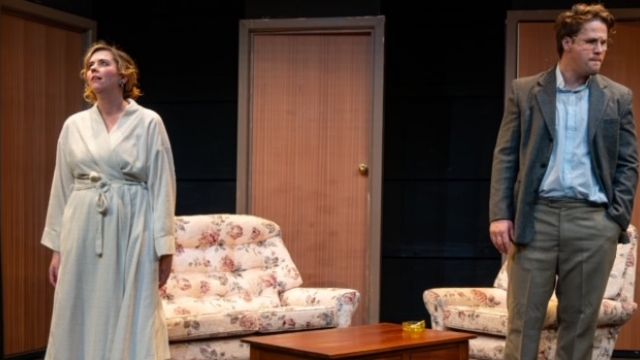The Real Thing
Accomplished community theatre director Michelle Swann made her Williamstown Little Theatre directorial debut these last weeks with the heavily accoladed Tom Stoppard play of bourgeois adultery, The Real Thing.
The play seems to be revived every 10-15 years for a new generation of theatre goers testing whether its acid bath of love and marriage marinated in old pop songs still resonates with audiences.
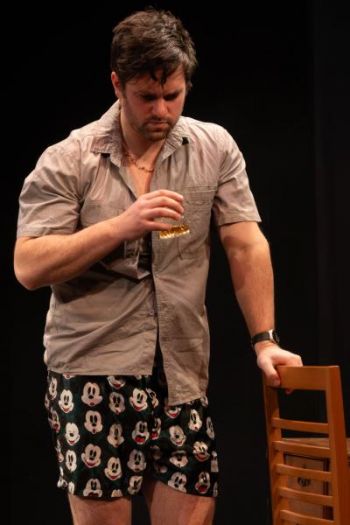 I last saw it produced by the Sydney Theatre Company at the Opera House’s Drama Theatre in 2019 and it still packed a punch then.
I last saw it produced by the Sydney Theatre Company at the Opera House’s Drama Theatre in 2019 and it still packed a punch then.
In Melbourne‘s 2024 mid-winter, in a re-purposed Williamstown bakery, this intelligently directed creative and energetic cast and crew have again given the play new life.
Though it must be said that each new exposure to the aging script does expose more of the multitude of sexist attitudes and remarks that were somehow less appalling in the 1980s.
The play aptly opens with The Righteous Brothers’ “You’ve Lost That Loving Feeling”smoothly setting the scene for the play‘s two central questions - what do we do when romantic love fades and how do we know if love (or music or writing or people for that matter) are ever real anyway ? After all can something be the real thing if it doesn’t last ?
Max Paterson is superbly cast as Henry the successful (Stoppard similiar) supercilious dramatist. Henry is the master wordsmith smugly occupying his high-brow literary world, pouring that dreadful 1980s confection Bucks Fizz all round and patronising pretty much everyone particularly his actress wife Charlotte (played with understated charm and assurance by Gabrielle Lyons).
Infected by the reckless excitement of new love, Henry abandons Charlotte to marry the exuberant Annie (played with building layers of confidence, compassion and insight by Gabrielle Angelone) another actress and the wife of actor Max (played authentically and earthily by Paul Allica) with whom Charlotte has just been acting in Henry’s play within the play, ironically titled House of Cards.
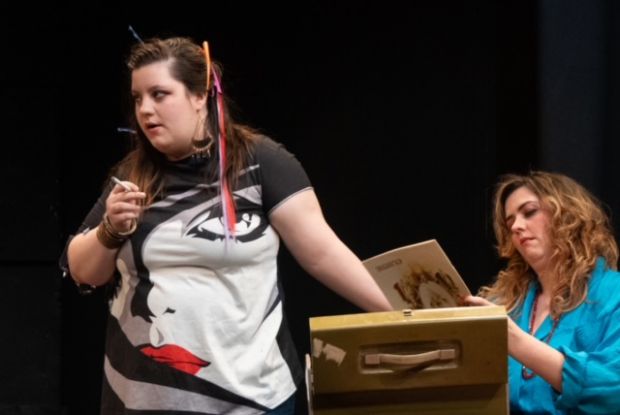
When Henry loses his loving feeling for Charlotte he doesn’t keep his side of the romance bargain (to remake it every day), instead finding in Annie a fresh Eliza to play to his Higgins so he can showcase his mastery in choosing perfect words and putting them ever so cleverly together.
Henry believes his and Annie’s love is real though - Henry of Mayfair is after all the last great romantic - and the question becomes can he actually write something real ? The one piece of real craftsmanship Henry’s beloved seeks from him, he struggles to deliver.
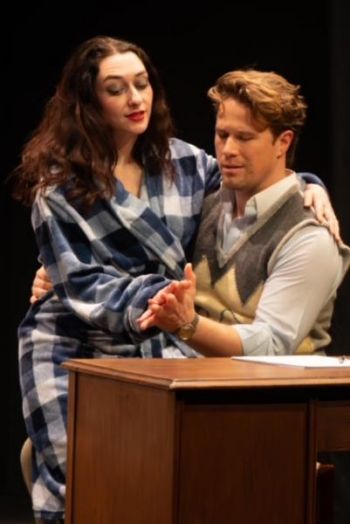 The counterpoint to this unwritable reality is the unreadable reality TV play written by working class Brodie (played broodingly by Taine Rutherford) a Scottish soldier who has been imprisoned for setting fire to a wreath at a cenotaph, an act of impulsive passion motivated by an inflammation for Annie who he has just met on the train. The play makes it beautifully clear that smart and not, we are all fools in love.
The counterpoint to this unwritable reality is the unreadable reality TV play written by working class Brodie (played broodingly by Taine Rutherford) a Scottish soldier who has been imprisoned for setting fire to a wreath at a cenotaph, an act of impulsive passion motivated by an inflammation for Annie who he has just met on the train. The play makes it beautifully clear that smart and not, we are all fools in love.
And we are all flattered by love. Annie takes up not only Brodie‘s cause but there’s plenty of room left to be swayed by the devotions of young colleague Billy (played with a touch of melodrama by Wade Lindstrom). Henry it seems has a taste for women with big appetites for love about which he has little idea because he is so preoccupied with himself.
Our main characters all find themselves in relationships with people they don’t know. Their choice on stage, as in life, is between make-believe and curiosity and learning. They can choose, all of them, to be adroitly entertaining and superficial or to be achingly and exhaustingly real.
Except that is for Debbie (played with great freshness and spark by Charlie Nolan-Jones), Henry and Charlotte‘s 17 year old daughter, now ready to hook up with a travelling musician and leave home. Debbie is the totally real thing from the get-go and sets the stage alight with her difference. One wonders what will happen when she falls in love for the first time?
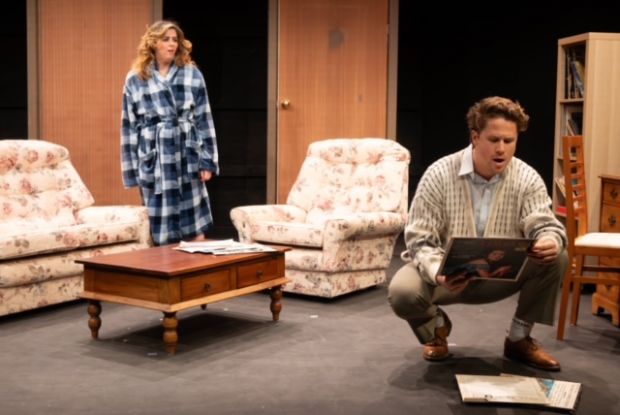
The moments between Henry and daughter Debbie were the peak of Henry’s dramatic arc in this play as Max Paterson allowed his Henry to realise the cost of love and its inseparability from pain. The actor’s brilliant face and voice control in this scene (amongst numerous others) give the audience much more Henry than is on the page. There is no trick in just saying the lines, just as there is no trick in loving somebody at their best.
Henry is an extraordinarily demanding role with a long, dense and complex text. Max Paterson masters the role technically, with precision timing and robust physical presence. He deftly delivers the clever witticisms and the famous speeches while manoeuvring through the many suitably superior moves - the swaggers, puffs of the chest, hands behind the head and shoes on the furniture.
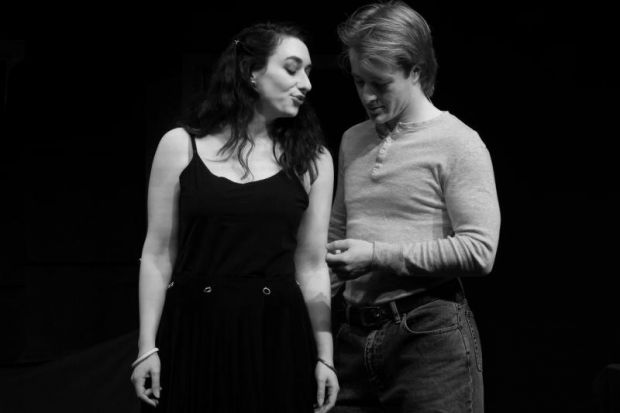
The revelation is that Paterson actually makes his Henry appealing rather than the pompous smart-arse he has been in some productions. His beginning of emotional awakening - when love is gone everything is pain - becomes wholly believable. And Paterson’s Henry can be playful as well as cocky such as when as when he acts out the choo-choo train. In short Paterson gives us that rare thing - a glimpse at a ‘real’ Henry who knows the torment of not being able to put things back, but who might be choosing raw, messy real love after all.
I think the audience at Williamstown‘s Little Theatre believed exactly that the night I was there, as they joyously sang along with The Monkees’ “I’m a Believer” while the cast took their well-deserved curtain call.
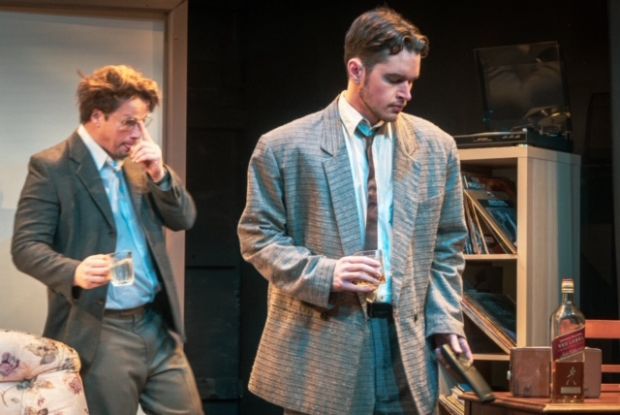
What a warm, fresh and funny new take on The Real Thing it was - it will be great to see what these talented players do next.
Sue Dahn
Subscribe to our E-Newsletter, buy our latest print edition or find a Performing Arts book at Book Nook.

